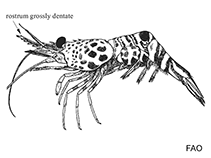Cinetorhynchus erythrostictus Okuno, 1997
Red-spot hinge-beak shrimpGoogle image | No image available for this species;
drawing shows typical species in Rhynchocinetidae.
Classification / Names Common names | Synonyms | CoL | ITIS | WoRMS
Malacostraca | Decapoda | Rhynchocinetidae
Environment: milieu / climate zone / depth range / distribution range Ecology
Benthic. Tropical
Distribution Countries | FAO areas | Ecosystems | Occurrences | Introductions
Western Pacific: Japan and New Caledonia.
Length at first maturity / Size / Weight / Age
Maturity: Lm ? range ? - ? cm Max length : 5.0 cm TL male/unsexed; (Ref. 842)
Life cycle and mating behavior Maturity | Reproduction | Spawning | Eggs | Fecundity | Larvae
Main reference
References | Coordinator | Collaborators
Legall, N. and J. Poupin 2015 CRUSTA: Database of Crustacea (Decapoda and Stomatopoda), with special interest for those collected in French overseas territories. http://crustiesfroverseas.free.fr/ [Accessed 02/03/2015]. (Ref. 100230)
IUCN Red List Status
(Ref. 130435: Version 2025-1)
CITES status (Ref. 108899)
CMS (Ref. 116361)
Threat to humans
Human uses
| FishSource |
Tools
More information
Diet composition
Food consumption
Predators
Max. ages / sizes
Length-weight rel.
Length-length rel.
Length-frequencies
Mass conversion
Abundance
Internet sources
BHL | BOLD Systems | CISTI | DiscoverLife | FAO(Publication : search) | Fishipedia | GenBank (genome, nucleotide) | GloBI | Gomexsi | Google Books | Google Scholar | Google | PubMed | Tree of Life | Wikipedia (Go, Search) | Zoological Record



